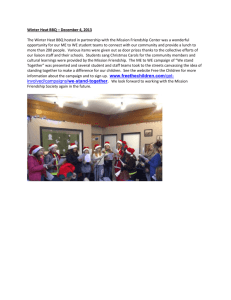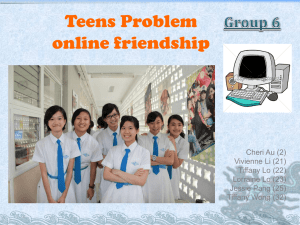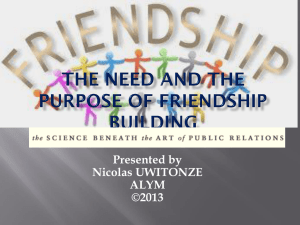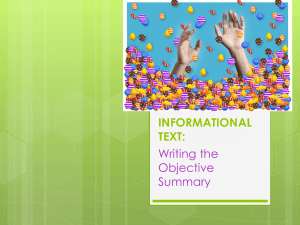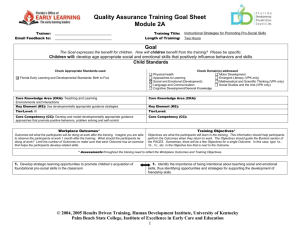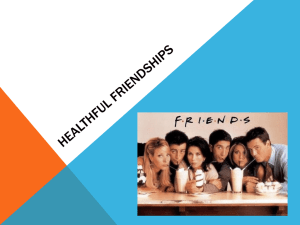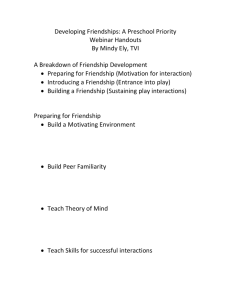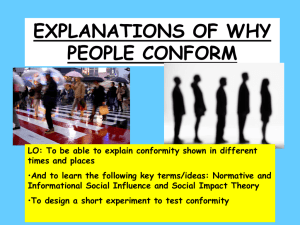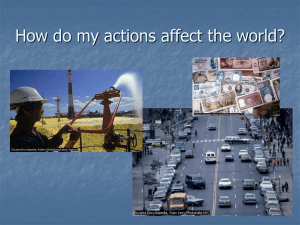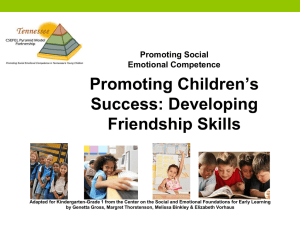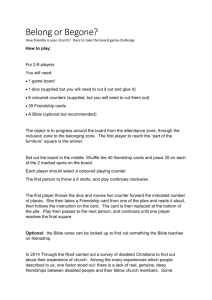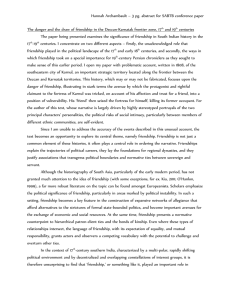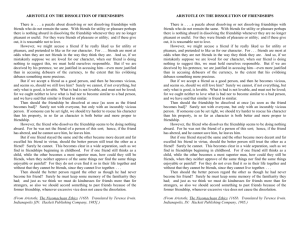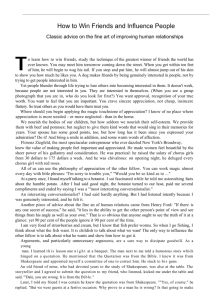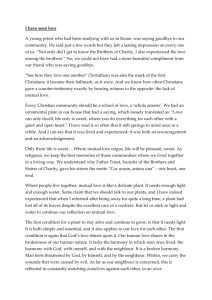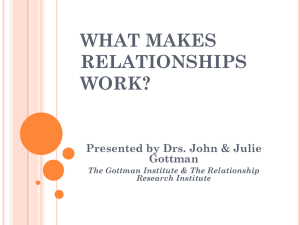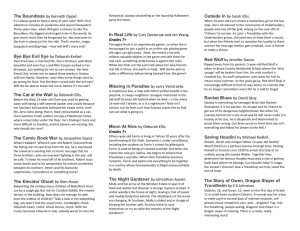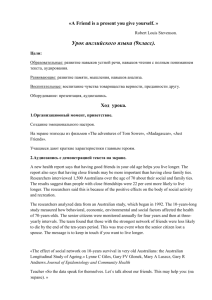HOW TO WIN FRIENDS AND INFLUENCE PEOPLE
advertisement
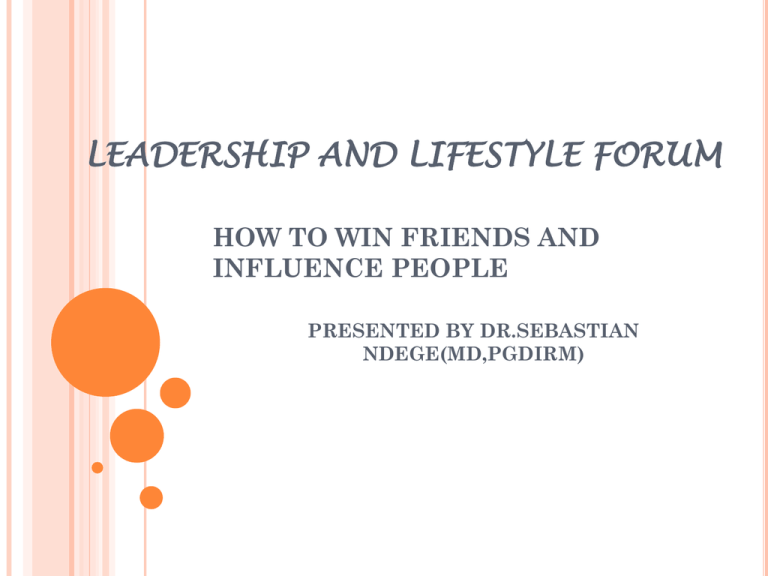
LEADERSHIP AND LIFESTYLE FORUM HOW TO WIN FRIENDS AND INFLUENCE PEOPLE PRESENTED BY DR.SEBASTIAN NDEGE(MD,PGDIRM) OVERVIEW OF PRESENTATION Defining Friendship and influence The Behavioral change vicious Circle Creating influence Few tips on Winning Few tips on changing people Conclusion DEFINING FRIENDSHIP AND INFLUENCE Friendship is a type of relationship between two people who care about each other. A friend is the first person you want to call when you hear good news. A friend remembers that you like chachandu on your Mishikaki. A friend will accompany you on the most boring of errands and make them seem fun. FRIENDSHIP ELEMENTS The tendency to desire what is best for the other Sympathy and empathy Honesty, perhaps in situations where it may be difficult for others to speak the truth, especially in terms of pointing out the perceived faults of one's counterpart FRIENDSHIP PILLARS Mutual understanding and compassion Trust in one another (able to express feelings - including in relation to the other's actions - without the fear of being judged); able to go to each other for emotional support Positive reciprocity - a relationship is based on equal give and take between the two parties. INFLUENCE DEFINED Social influence occurs when an individual's thoughts, feelings or actions are affected by other people. Social influence takes many forms and can be seen in conformity, socialization, peer pressure, obedience, leadership, persuasion, sales, and marketing. In 1958, Harvard psychologist, Herbert Kelman identified three broad varieties of social influence. INFLUENCE Compliance is when people appear to agree with others, but actually keep their dissenting opinions private. Identification is when people are influenced by someone who is liked and respected, such as a famous celebrity or a favorite uncle. Internalization is when people accept a belief or behavior and agree both publicly and privately. BEHAVIOURAL VICIOUS CIRCLE INFORMATION BELIEF ATTITUDE Positive Negative ACTIONS A totality of actions is what formulate a BEHAVIOUR I simple terms, WE ARE WHAT WE KNOW,BELIEVE AND ACT. WORKING WITH PEOPLE Ask the successful CEOs of major corporations, entrepreneurs, top salespeople, and pastors what characteristic is most needed for success in leadership positions, and they’ll tell you—it’s the ability to work with people. Some people are born with great relationship skills, but those who are not can learn to improve them. KEY QUESTIONS Readiness: Are we prepared for relationships? Connection: Are we willing to focus on others? Trust: Can we build mutual trust? Investment: Are we willing to invest in others? Synergy: Can we create a win-win relationship? Are we ready to nurture? INFLUENCE Morton Deutsch and Harold Gerard described two psychological needs that lead humans to conform to the expectations of others. These include -our need to be right (informational social influence -our need to be liked (normative social influence). INFLUENCE Informational influence is an influence to accept information from another as evidence about reality. Informational influence comes into play when people are uncertain, either because stimuli are intrinsically ambiguous or because there is social disagreement. INFLUENCE Normative influence is an influence to conform to the positive expectations of others. Normative influence leads to public compliance, whereas informational influence leads to private acceptance.(Kelmans Typology) HOW TO CREATE INFLUENCE Be a good listener -different from active listening -ask more questions -listen to complaints to ease tensions Talk in terms of the other person’s interests. -find out about their interests -ask ?s about their interests Make the other person feel important & appreciated -recognize tangible contributions Lead the way.. HOW TO WIN PEOPLE TO YOUR WAY OF THINKING Begin in a friendly way -start the conversation with sincere praise. -A pleasant tone of voice can make a big difference! Try to honestly see things from the other person’s point of view -Ask yourself, why would he/she want to do what I ask? -Where do our opinions on the topic differ? HOW TO WIN PEOPLE TO YOUR WAY OF THINKING Get the other person to say “yes, yes” ASAP -Environment saturated with info. -Emphasize what both parties agree on -momentum of the conversation Appeal to nobler motives -People take actions… -one or more HOW TO CHANGE PEOPLE… Call attention to people’s mistakes indirectly -Harsh criticism can discourage others -Ex. Ask him/her to consider other points-ofview Ask questions instead of giving direct orders -Effect this has -Ex. Would it make sense to call the client first? What do you think? HOW TO CHANGE PEOPLE… Let the other person save face -Help others avoid embarrassment -If you must give criticism, do so in private! - Ex. Demotion/title change CONCLUSION It's not how much you accomplish in life that really counts, but how much you give to other. It's not how high you build your dreams that makes a difference, but how high your faith can climb. It's not how many goals you reach, but how many lives you touch. It's not who you know that matters, but who you are inside. Believe in the impossible, hold tight to the incredible, and live each day to its fullest potential. You can make a difference in your world.(Rebecca Barlow) END ………………QUESTIONS?
